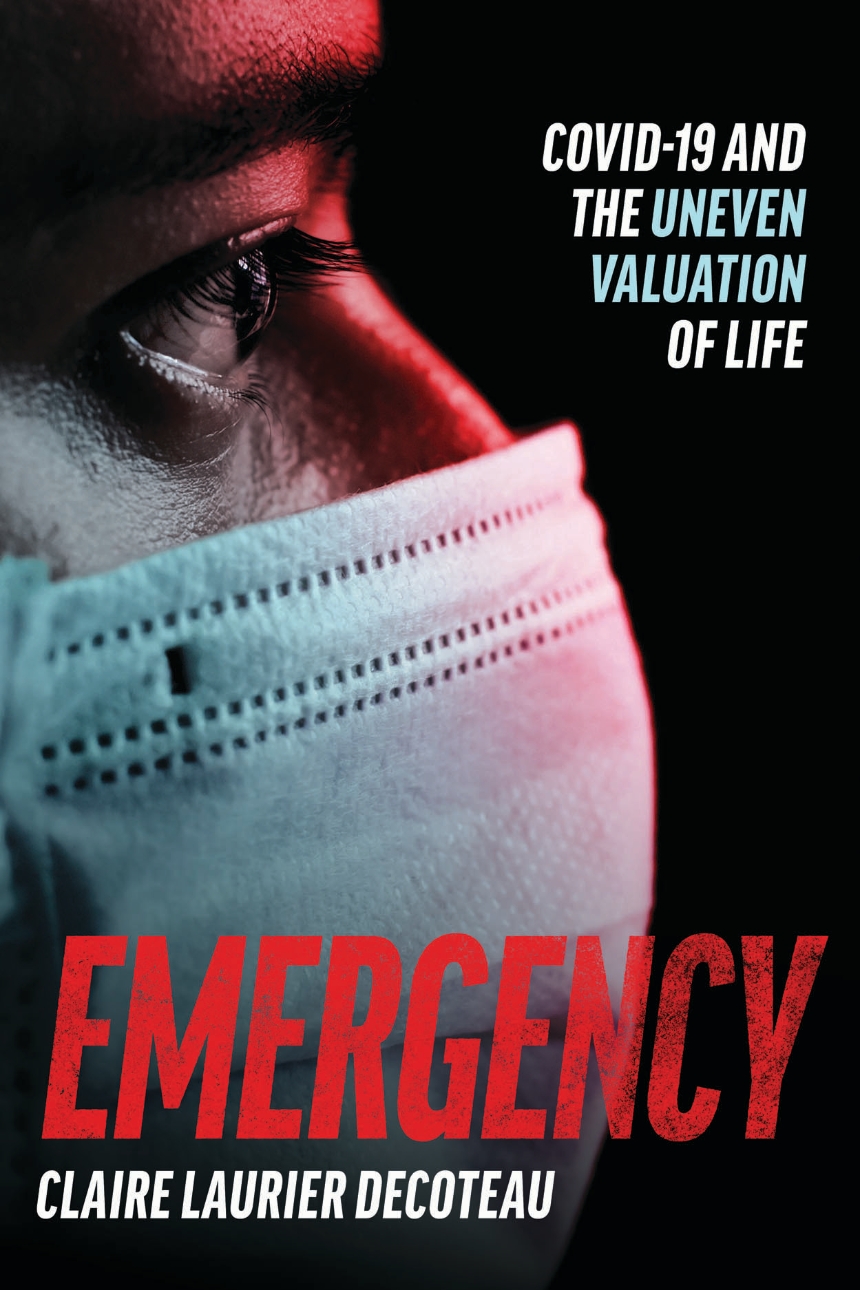Emergency
COVID-19 and the Uneven Valuation of Life
A forceful critique of how and why states failed to protect marginalized communities in their responses to the COVID-19 pandemic and the implications of ignoring the existing emergencies that exacerbated the pandemic’s devastating effects.
The COVID-19 pandemic inaugurated a state of emergency unprecedented for most Americans. Some could observe this emergency from the relative safety of their homes by working remotely, conducting routine medical appointments over video calls, and getting groceries by delivery. At the same time, those in marginalized communities got sick and died without access to the same privileges, sometimes even at the expense of others. After all, someone had to ship goods from warehouses, someone had to clean the hospital, and someone had to shelve and deliver groceries.
In this book, sociologist Claire Laurier Decoteau attempts to document and theorize the emergencies of COVID-19 by looking at the experiences of Chicagoans and the policies that shaped those experiences. She describes the uneven racial impact of COVID-19 on Black and Latinx Chicagoans as a crisis within a crisis, caused by a convergence of emergencies: a state of emergency that protected white supremacy and wealth, the slow emergencies racially marginalized populations have faced due to the long-term gutting of care infrastructure and deindustrialization, and the sacrifice “essential workers” were asked to make to protect the United States economy. As Decoteau shows, the city’s “racial equity” project attempted to manage these converging emergencies by building up epistemic infrastructure and manipulating epidemiological data. City officials used data to determine which communities would be given scarce resources, but once positivity or death rates declined, resources were retracted and redistributed elsewhere. The city focused on the urgent and spectacular while ignoring the long-term disinvestment in marginalized communities, including healthcare resources. Decoteau makes clear that the emergencies precipitated by COVID-19 long predated the pandemic, and that we will continue to live with their compounding crises if we do not tackle their structural underpinnings.
The COVID-19 pandemic inaugurated a state of emergency unprecedented for most Americans. Some could observe this emergency from the relative safety of their homes by working remotely, conducting routine medical appointments over video calls, and getting groceries by delivery. At the same time, those in marginalized communities got sick and died without access to the same privileges, sometimes even at the expense of others. After all, someone had to ship goods from warehouses, someone had to clean the hospital, and someone had to shelve and deliver groceries.
In this book, sociologist Claire Laurier Decoteau attempts to document and theorize the emergencies of COVID-19 by looking at the experiences of Chicagoans and the policies that shaped those experiences. She describes the uneven racial impact of COVID-19 on Black and Latinx Chicagoans as a crisis within a crisis, caused by a convergence of emergencies: a state of emergency that protected white supremacy and wealth, the slow emergencies racially marginalized populations have faced due to the long-term gutting of care infrastructure and deindustrialization, and the sacrifice “essential workers” were asked to make to protect the United States economy. As Decoteau shows, the city’s “racial equity” project attempted to manage these converging emergencies by building up epistemic infrastructure and manipulating epidemiological data. City officials used data to determine which communities would be given scarce resources, but once positivity or death rates declined, resources were retracted and redistributed elsewhere. The city focused on the urgent and spectacular while ignoring the long-term disinvestment in marginalized communities, including healthcare resources. Decoteau makes clear that the emergencies precipitated by COVID-19 long predated the pandemic, and that we will continue to live with their compounding crises if we do not tackle their structural underpinnings.
Table of Contents
List of Abbreviations
List of Figures and Tables
Preface
Introduction: Converging COVID-19 Emergencies
1: Exposing and Governing Racism
2: Fragmented Health Infrastructure
3: Quantifying Racial Emergencies
4: Slow Emergencies
5: Sacrificing “Essential” Workers
6: Trust and Distrust in Pandemic Times
Coda: Lest We Forget
Acknowledgments
Appendix A: Timeline of Important COVID-19 Dates
Appendix B: Methods
Notes
References
Index
List of Figures and Tables
Preface
Introduction: Converging COVID-19 Emergencies
1: Exposing and Governing Racism
2: Fragmented Health Infrastructure
3: Quantifying Racial Emergencies
4: Slow Emergencies
5: Sacrificing “Essential” Workers
6: Trust and Distrust in Pandemic Times
Coda: Lest We Forget
Acknowledgments
Appendix A: Timeline of Important COVID-19 Dates
Appendix B: Methods
Notes
References
Index
